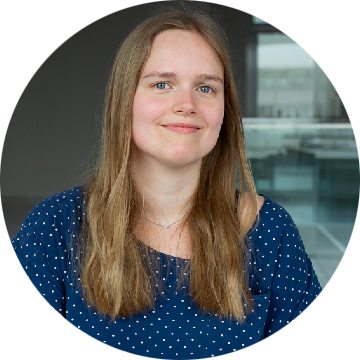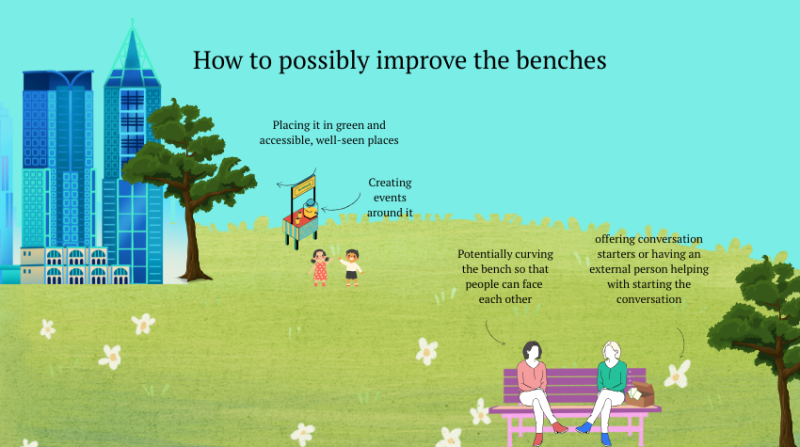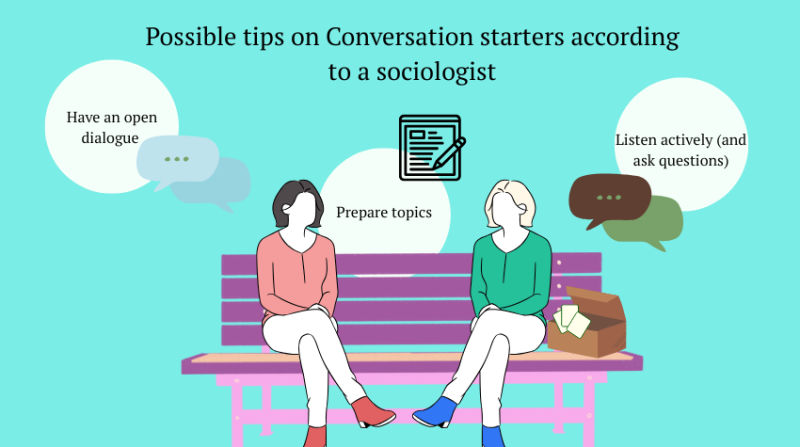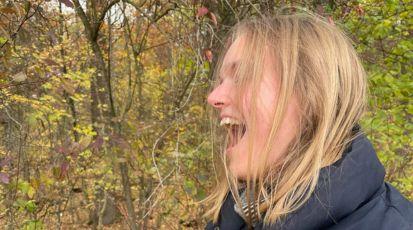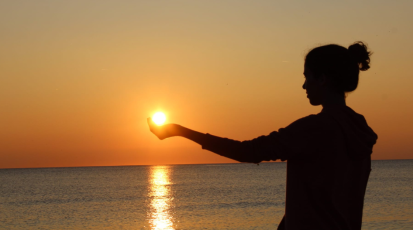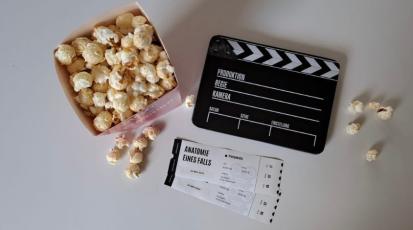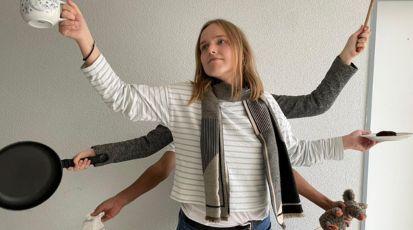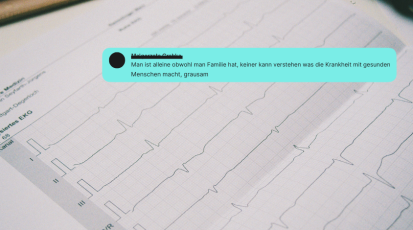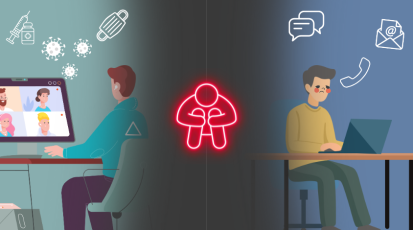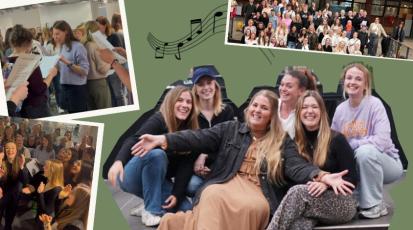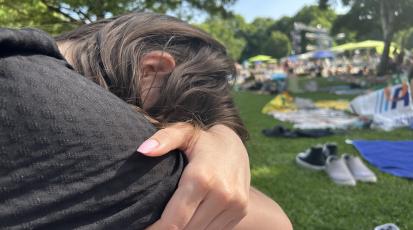Take a seat, start a connection
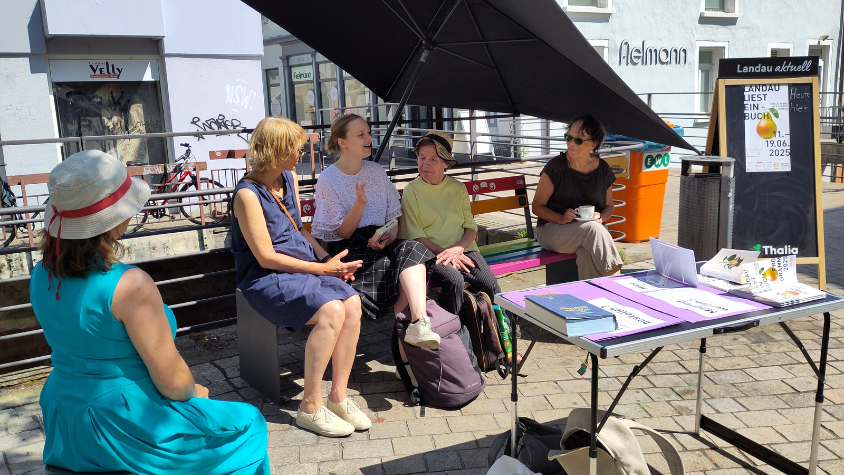
Ursel Gwynnie Mantel is sitting on a colorful bench in the middle of Landau, the city around her bustling with excitement on a sunny day. On her lap she is holding a book in her wrinkly hands, a small smile on her lips as she is talking to the women surrounding her. She speaks of her childhood, of her escape from her home country, and of the book she is carrying with her. Everyone around her is listening attentively.
What seems like a regular bench that Ursel is sitting on is actually a “Plauderbank”. A “talking bench,” designed and placed by cities and villages to invite strangers to sit down, take a rest – and start a conversation with strangers.
Here, next to a C&A store, a bench has turned into a meeting place – because loneliness affects everyone in every generation.
Loneliness as a global problem
In Germany the Federal Ministry of Education, Family Affairs, Senior Citizens, Women and Youth measured the so-called loneliness barometer of 2024. According to their findings, around 15 percent of 18-to 29 years old and 10 percent of people older than 75 years felt lonely in 2021. The World Health Organization also reports that “overall, an estimated 15.8 percent of the world’s population was lonely between 2014 and 2023.”
Interested in more international stories on loneliness? Please follow this link!
That is why Landau and other cities have placed these Plauderbänke, such as the one colored like a rainbow in Landau – and it is as simple as just placing a bench in the cities.
On this Saturday, the 21st of June, an event takes place called “Landau liest ein Buch,” literally translated: “Landau reads a book”. The manager of this event on that day, Lisa Kasprowiak (short for Elisabeth), prepared the stand beforehand, placing flyers and a book on a table in front of the bench. She carries a smile as she is approaching anyone coming even near the table.
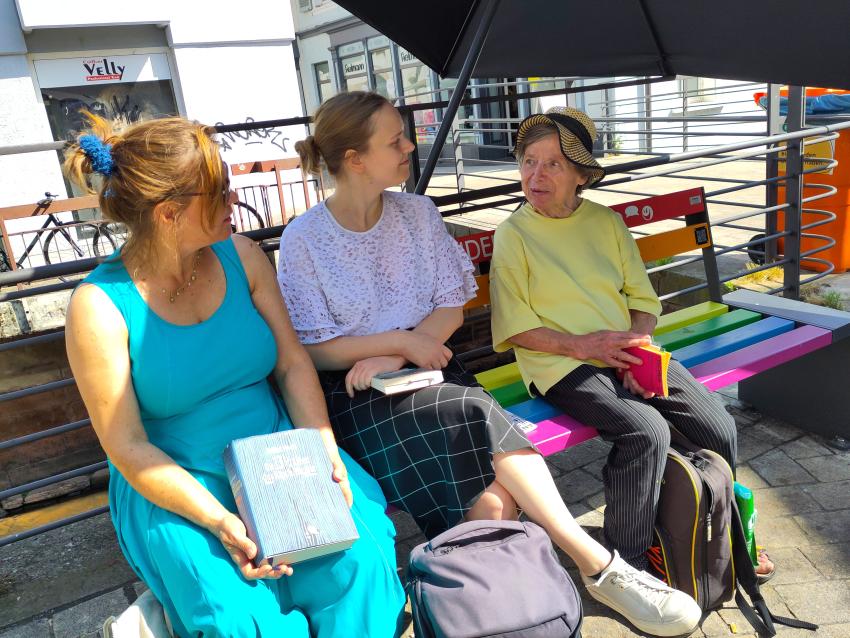
Cities building connections
Cities like Ettlingen, Landau, or Heidelberg have introduced Plauderbänke to the public sphere. Some other cities, like Konstanz, even have placed a variation of the Plauderbänke by calling it a humor bench, meant to make people laugh with each other by giving them funny ideas.
In Ettlingen, the Plauderbänke stand in public parks. Luisa Adamzseski is representative for senior citizens and the interests of people with disabilities in Ettlingen. She explains that one location was created during Covid and mostly was supposed to invite elders so that they could meet in the fresh air, minimizing the infection risk and offering a meeting place.
Other benches were already used in order to have conversations before, however, more benches were introduced to the public as talking benches to extend the offer. Adamzseski also holds her consultation hours on Tuesdays, so that anyone can approach her.
But can such a simple concept really connect people?
Germany isn't alone in the battle against loneliness. Other countries are also trying to provide options and solutions, such as the UK´s Chatty Cafe Scheme, where they offer tables specifically designed for meeting and connecting with new people. In other countries and cities, for example in Southampton, talking benches can also be found. In Canada they have a similar concept, the so-called Friendship Bench, where students can connect over things like mental health.
Experiences of loneliness
Meeting new people and/ or finding deep connections, especially in cities, can pose a challenge for many. The article “Urban Sanity – Understanding Urban Mental Health Impacts and How to Create Saner, Happier Cities” by Todd Litman of the Victoria Transport Policy Institute examines how urban living affects the people's mental health and happiness. The article suggests that socially connected neighborhoods report better physical and mental well-being. That is why the paper suggests measures such as creating “public spaces that promote community and encourage positive interactions among residents.” They should be inclusive and accessible.
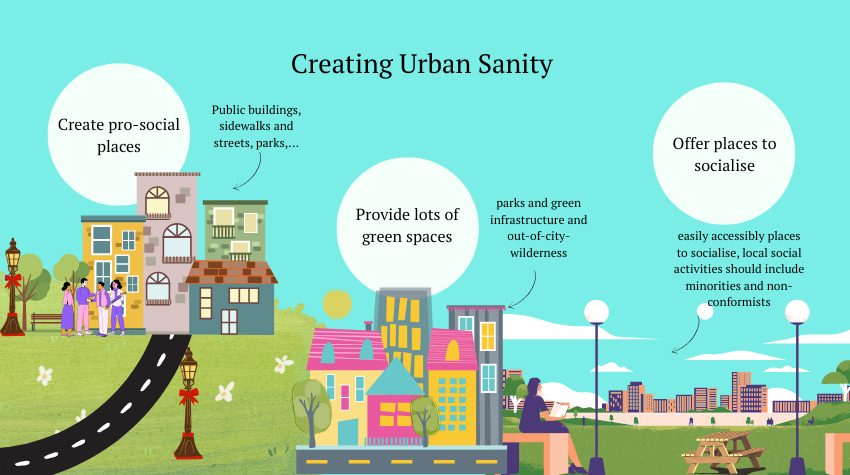
In Heidelberg, the inclusive factor and reaching older people was one of the determinants in choosing the locations of the Plauderbänke, according to Jessica Vierling. She is representing the representative of the Plauderbänke. The senior citizens center also started an urban gardening project near one of the other benches. The next bench is supposed to become a part of a larger meeting place with a couple of events planned around it. Heidelberg also used already existing benches, having asked the question of where they could find older people in their everyday life. Vierling believes that “there is a need for conversations and some obstacles occur in that regard over and over again. Still, it isn't a new concept that people sit down on a bench, have never met before, and one of them has the need to tell something. That takes place every day, for example by the bus stop or on other benches. And in the end, you don't know if the other person is prepared for that or whether he wants that.” By offering Plauderbänke and making them accessible, you can take away these concerns.
However, there could still be more popularity surrounding the benches. In Heidelberg, Vierling reports that they know the bench is well-used but cannot give an exact number.
In Ettlingen, Adamzseski reports that during her consolation hours, around one to four people visit the Plauderbank. Meanwhile, the manager of “Landau liest ein Buch,” Kasprowiak, visited the bench in Landau a couple of times beforehand and says that there are rarely people sitting down in order to really look for a conversation. Most of them are people wanting to take a rest or men waiting for their wives to come back from shopping.
What is really needed to make the concept work?
Oliver Langewitz is a sociologist specialized in communication. In his opinion, cities and politics should actively try to battle loneliness. However, he also says, “You really have to make sure that the offers are not just token offers and society says, ‘hey let's put a Plauderbank there; goal fulfilled,’ but that they are also lived.” In order to do that, some things need to be considered, such as "What mechanisms are needed to appeal to the target group? How can you design the offers so that they come back?” He also mentions how lonely and isolated people might struggle more with sitting down and approaching strangers. He says that cities could work actively and create inclusive meeting places; that is possible even around Plauderbänke. “It has to be a place full of quality.” They could do that by creating city festivals, cultural offers, and social offers and creating meeting places such as permanently installed places like the Plauderbank or the city center. For a meeting place to be sustainable, it needs to be a place that people feel welcome in and a place where people want to return to, says sociologist Langewitz. If a meeting place is created for individuals, the overall subjective quality of the city might improve, making the individual feel more comfortable. According to the sociologist, the bench poses strengths, such as being easily accessible and therefore possibly making it easier for people to sit down who otherwise might have to overcome bigger obstacles, such as physically entering a building. However, he also mentions that it depends on the personalities sitting down if they can create a place of meeting or build deeper connections.
Jessica Vierling from Heidelberg agrees that a bench can’t solve the problem of loneliness. According to her, the solutions have to be sustainable. She stresses that neighborhood and community are growing steadily and depend upon many factors. A Plauderbank might set an impulse; however, it’s one of many needed.
Meanwhile in Landau, the older woman Ursel tells her life story on the Plauderbank. Even though she was quiet at the beginning of the event, she started opening up as she was asked where she is from. She looks at the women surrounding her, whom she met only a couple of minutes ago, and says, “My parents are from the Czech Republic. My family escaped.” She tells of their escape. She tells of her studies later on in Theology and Ancient Near Eastern Studies, of her life, of the choir she used to visit, and of the scouts that she is still a part of. Ursel isn’t the only one opening up. On this day, strangers exchange favorite passages of the books they brought along, thoughts on books, and their favorite poems and listen and talk actively to each other.
In Ettlingen, the representative of the Plauderbänke Luisa Adamzseski reports similar experiences: On the bench, people tend to talk a lot about their childhood. They exchange stories, compare experiences, and joke along. She says, “Many are happy and grateful that the benches exist, that you have the opportunity to get in touch, have a conversation, and bring your concerns with you.” So, something about the benches appears to make the people open up.
Improving a simple concept for bigger effects
Both representatives of the Plauderbank in Heidelberg and Ettlingen admit that there is still potential going forward and that they could make the benches more visible, also to younger people.
The people sitting on the bench in Landau don’t seem lonely but rather very sociable. Ursel isn't lacking social interactions. She is still active in church and member of the scouts and meets many people. She already took part in two other events of “Landau liest ein Buch.” It appears easy to her to open up and approach others.
Ursel sings songs by Erich Kästner to the group, another visitor of the bench and part of the club “Landau liest ein Buch” Anke Scholz tells the group why she loves "The 13 and a Half lives of Captain Bluebear," Kasprowiak reads a poem from 13 Months, written by Erich Kästner, and two other women talk about “Windstärke 17,” literally translated “Wind force 17,” and about the book that the event management picked. The women smile at each other in the end, describing the event as both “peaceful and sociable."
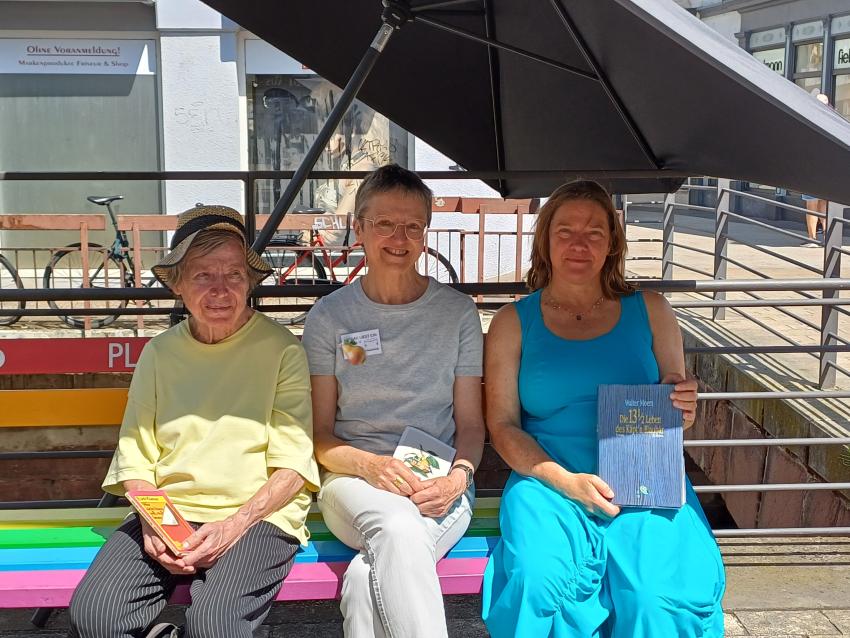
If you are struggling with loneliness yourself, there are various services where you can get help at any time. In Germany, for instance, you can find a list of support centres via the ‘Kompetenznetz Einsamkeit’ website. An international offer is ‘Find A Helpline’, a tool that connects people in over 130 countries with certified counselling services that can be searched by topic – including loneliness.

